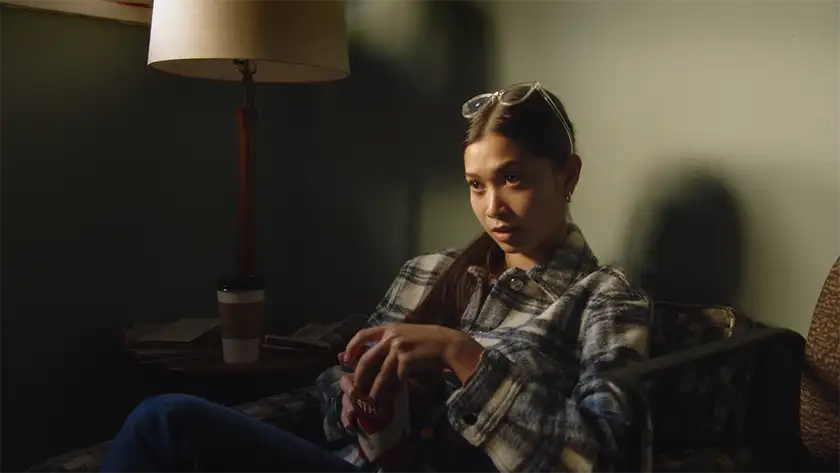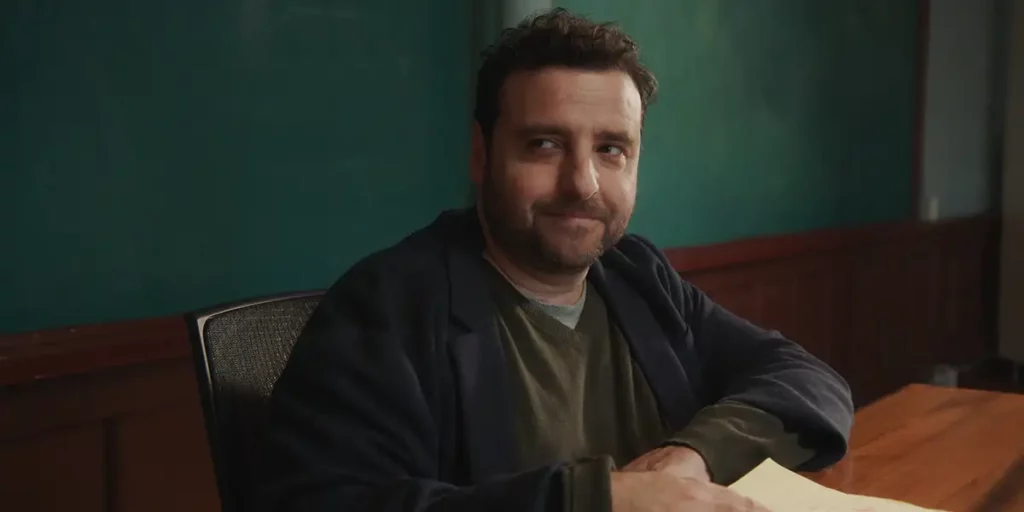Boy Byington’s Lousy Carter, a dry dramedy about a terminally ill literary professor coming to terms with his own mortality, is too uncomfortable to be funny.
Films that revolve around terminal illness, like Lousy Carter, are often about the ill party attempting to enjoy the last time that they have on the planet. The gentle oblivion that they anticipate often means that the characters search for that last grasp at life. Jonathan Levine’s 50/50 manages to balance the melancholia of this really well, with its cancer-stricken protagonist finding a spring in their step. In Bob Byington’s dramedy Lousy Carter, the titular literary professor protagonist (David Krumholtz) gets diagnosed with a nondescript terminal diagnosis and struggles to deal with the ending of his mortality. But he refuses to make this his chance at attaining a more amenable outlook on life, choosing instead to remain self-defeating and miserable. This makes Byington’s dramedy an uncomfortable watch, with the character being put on an unattainably abrasive level.
Lousy, a cruel nickname given to him by punishing children for his inability to strike a golf ball, is a failing animator, whose one stroke of success came over 10 years ago, and got him a position teaching at a university. Having been given 6 months left to live, the cynical and immature man-baby (as called by his ex-wife) resumes drinking. There is an odd encounter with a shop clerk who refuses to serve the professor until he is bribed that sums up the acrid sense of humour Byington has. He also has a strange cynicism towards professionals. Each so-called professional in this supposedly grounded indie is a caricature. The best friend, Kaminsky (Martin Starr), talks in clipped tones, his air of intellectuality coming across less as snobbish and more like a failure to write the character as corporeal. And then there’s the therapist, who speaks to Lousy like he’s reading a character sheet, and the student that Lousy begins seeking a sexual relationship with, as he’s going to die anyway.
That student is Gail (Luxy Banner), who is the brightest part in a film that surrounds itself with pathetic characters. The teenager is a spunky parallel to Lousy, in which her outlook on life hasn’t been spoiled by life yet. Her retorts to Lousy about “The Great Gatsby” – a book Lousy holds dear – are a highlight, and the criticisms she has then becomes central to Byington’s film. Lousy is portrayed as a hybrid of F Scott Fitzgerald, author of “The Great Gatsby,” and the novel’s central character. If that wasn’t obvious from the subtext, the script has him detail that out loud in a moment of blunt self-reflection.

There’s an irony to a central character embodying a literary character, where you’d think Lousy would earn some kind of character arc, like the character does. But there’s a giant vacuum in the film that never gets filled, where the character of Lousy is called “emotionally vacant”, and ultimately that is what Lousy Carter becomes. It is hollow and stilted, where Lousy – it must be said that Krumholtz plays curmudgeon very well – is a character you don’t want to spend any time with and you don’t root for. In fact, the character is so frustratingly morose that none of the comedic beats, all of which are played in the same parched way, land.
The craft employed is also more than occasionally poor, with awkward transitions and a bland shot-reverse-shot shooting style. To see something like Lousy Carter, in which it doesn’t seem that Byington has made good use of his budget or the materials at hand, is frustrating. Krumholtz recently starred in Christopher Nolan’s Oppenheimer, and to go from that filmmaking feat (granted a much bigger budget) to what feels like a student film feels odd. Even things like the sound design are employed with no tact, where a can of soda opening is louder than the dialogue spoken for no discernible reason.
While Lousy discusses the critical reception of “The Great Gatsby” at the time as missing the point of the book, one can only feel that everyone involved in this has missed the point too, as the film fails to gain any insight into the behaviour that created Lousy. So consider this negative review another parallel in Lousy’s journey to becoming F Scott Fitzgerald, where one will gladly be on the wrong side of history in 50 years time. That Lousy spending time pursuing a young girl makes Lousy Carter an uncomfortable watch, even if the literary works he mentions and wishes to adapt creatively – namely Nabokov – is a tongue-in-cheek self reference to it. But as Gail says, who wants to watch a movie about a pedophile?
Lousy Carter will be screened at the 2024 Glasgow Film Festival on Saturday, March 2, 2024. The film will be released in US theaters and on digital platforms on March 29, 2024. Read our Glasgow Film Festival reviews and our list of films to watch at the 2024 Glasgow Film Festival!

